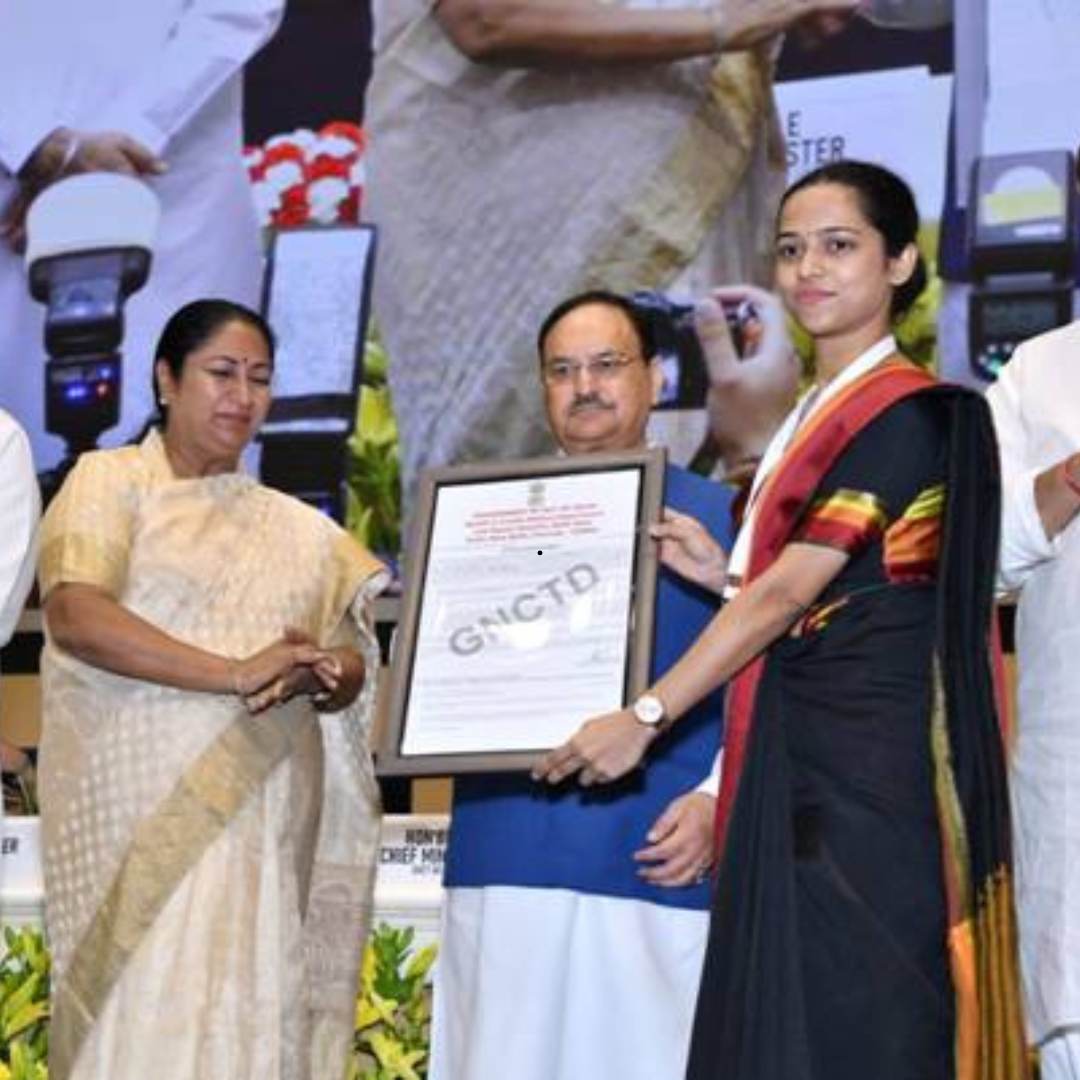In a significant step to strengthen Delhi’s healthcare system, Union Health Minister Shri Jagat Prakash Nadda handed over appointment letters to newly recruited Nursing Officers and Allied Healthcare Professionals and flagged off the Ayushman Bharat Registration Vans at a major event held at Vigyan Bhawan. The occasion was graced by Smt. Rekha Gupta, Chief Minister of NCT Delhi, along with several prominent ministers and dignitaries from both the central and state governments.
Joining the event were senior Delhi ministers Dr. Pankaj Kumar Singh (Health, Family Welfare, Transport & IT), Shri Ravinder Indraj Singh (Social Welfare, SC/ST Welfare & Elections), and Shri Manjinder Singh Sirsa (Industries, Food & Supplies, Environment & Forests), along with Members of Parliament Shri Ramvir Singh Bidhuri, Shri Praveen Khandelwal, Shri Yogender Chandolia, and Smt. Bansuri Swaraj.
A Landmark Moment for Healthcare Workforce
While addressing the gathering, Shri Nadda expressed that this was a “momentous occasion,” as nursing officers and allied healthcare professionals were being officially appointed after a wait of 15 years. The recruitment marks a substantial step toward reinforcing Delhi’s healthcare system, especially given the city’s heavy patient load as a national hub for advanced medical treatment.
“The appointment of skilled medical personnel is a critical step in our pursuit of universal health coverage. Delhi bears one of the highest patient inflows in India. With this, the healthcare system will be better equipped to meet this growing demand,” said Shri Nadda.
Commitment to Ayushman Bharat and PM-ABHIM
Emphasizing the central government’s unwavering commitment under the leadership of Prime Minister Narendra Modi, Shri Nadda highlighted the successful rollout of key healthcare initiatives—Ayushman Bharat – Pradhan Mantri Jan Arogya Yojana (AB-PMJAY) and the PM Ayushman Bharat Health Infrastructure Mission (PM-ABHIM). He shared that Delhi has already issued 4 lakh Ayushman Cards, including 2 lakh under the Vay Vandana scheme, specifically aimed at providing healthcare coverage to senior citizens aged 70 and above.
To further strengthen the health infrastructure, Shri Nadda urged full implementation of PM-ABHIM with the goal of establishing 1,100 Ayushman Arogya Mandirs (AAMs) in Delhi by March 31, 2026.
Healthcare Evolution: From Curative to Comprehensive Care
Shri Nadda highlighted the transition from a curative-only model to a comprehensive healthcare approach outlined in the National Health Policy 2017, which emphasizes preventive, promotive, curative, rehabilitative, and palliative care.
He emphasized the importance of Ayushman Arogya Mandirs in promoting early diagnosis and preventive healthcare. Significantly, extensive health screenings have already been conducted:
- 18 crore for hypertension
- 17 crore for diabetes
- 15 crore for oral cancer
- 7.5 crore for breast cancer
- 4.5 crore for cervical cancer
These screenings reflect a national movement towards proactive health management and disease prevention.
Remarkable Improvements in Public Health
Significant progress was also noted in maternal and child health metrics:
- Maternal Mortality Ratio decreased from 130 to 88 per lakh live births
- Infant Mortality Rate dropped from 39 to 26
- Under-Five Mortality Rate declined by 42%, surpassing the 14% global decline
- Neo-natal mortality reduced by 40%, much higher than the global average of 11%
Additionally, India’s fight against tuberculosis (TB) has seen impressive gains. According to the WHO Global TB Report 2024, India witnessed a 17.7% reduction in TB incidence, more than double the global average of 8.3%.
Expanding Medical Education and Capacity
In his speech, Shri Nadda celebrated the exponential growth in India’s medical education sector. Since 2014:
- The number of AIIMS has increased from 7 to 20 operational institutes
- Medical colleges grew from 387 to 780
- Medical seats have increased from 51,000 to 1,18,000, with a target to add another 75,000 seats over the next five years.
These strides not only address the doctor-patient ratio but also ensure better regional availability of skilled professionals.
Ayushman Bharat Registration Vans: Healthcare at Your Doorstep
A major highlight of the event was the launch of Ayushman Bharat Registration Vans. These specially designed 70 IEC vans will cover all 70 Assembly constituencies of Delhi, offering on-the-spot registration, awareness campaigns, and card issuance for low-income families and senior citizens.
Initially, 20 vans were flagged off, with one dedicated van allocated to each constituency for 30 days. These vans represent a mobile extension of India’s health mission—ensuring no eligible citizen is left behind.
Words from Delhi’s Chief Minister
Smt. Rekha Gupta reiterated Delhi’s commitment to the scheme and provided key updates:
- 4 lakh Ayushman Cards issued in Delhi
- 2,258 patients received treatment under the scheme
- 108 hospitals in Delhi empanelled
- 1700 crore Rupees allocated under PM-ABHIM
- 100 Ayushman Arogya Mandirs are ready, 34 have been inaugurated, and the rest will be launched within this month.
- Target of 100 AAMs per month to be launched moving forward
She also announced that Jan Aushadhi Kendras have now been established in every hospital of Delhi, ensuring access to affordable medicines.
Major Recruitment Drive to Address Shortages
As part of an ongoing recruitment drive, the Department of Health and Family Welfare, NCT Delhi, has issued appointment letters to 1,388 Nursing Officers and 41 Paramedical Officers selected through DSSSB. By July 3, 1,270 candidates had accepted their offers, with 577 completing document verification. This initiative aims to substantially ease the shortage of nursing and allied healthcare staff in Delhi’s public hospitals.
Conclusion: A Future-Ready Healthcare Vision
This comprehensive event not only signaled a renewed commitment to Delhi’s public health system but also exemplified the collaborative efforts of the Centre and the Delhi government to bring quality healthcare to the doorstep of every citizen. The appointment of thousands of medical professionals, rollout of mobile registration units, and expansive health infrastructure projects collectively reflect the government’s mission of ensuring Swasth Jeevan – Dignified, Accessible, and Equitable Healthcare for All.
As Delhi leads by example in implementing healthcare reforms, the rest of the nation watches closely, inspired by a vision that puts every citizen’s health at the forefront.




